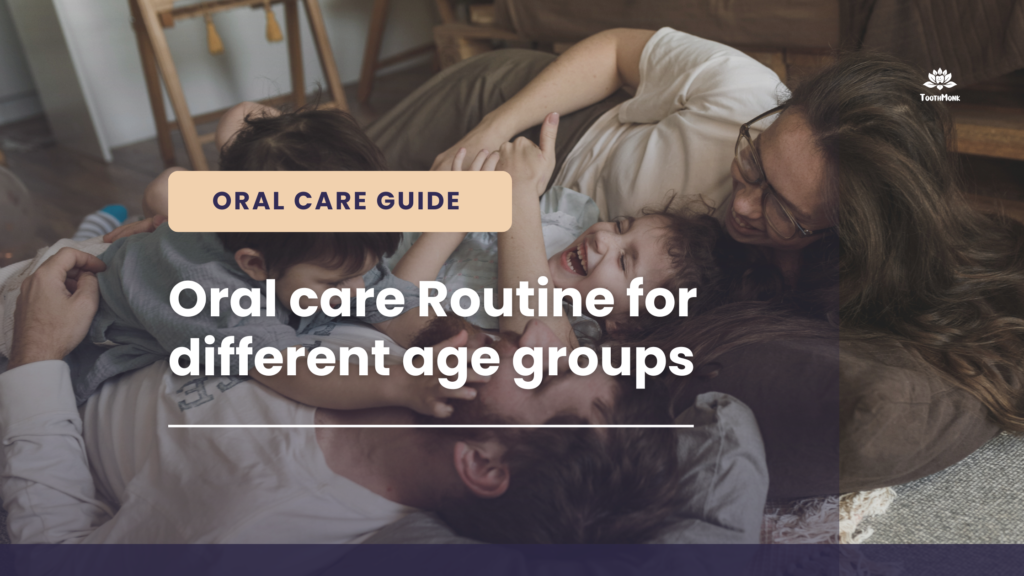
Oral Care Routine for Different Age Groups
A good oral care routine is essential at every stage of life. As we age, our dental needs change, making it crucial to adapt our oral hygiene practices accordingly. This guide provides a scientific and detailed breakdown of oral care routines tailored for different age groups, ensuring lifelong oral health.
Oral Care for Infants & Toddlers (0-3 Years)
Key Focus: Early Dental Hygiene & Preventing Cavities
- Clean the baby’s gums with a soft, damp cloth or a silicone finger brush after feedings to remove bacteria and milk residue.
- Once the first tooth erupts (usually around six months), use a soft-bristled toothbrush with a smear-sized amount (rice grain) of fluoride toothpaste.
- Avoid putting babies to sleep with a bottle to prevent early childhood caries (ECC), a condition caused by prolonged exposure to sugars.
- Introduce a fluoride varnish application by a pediatric dentist to strengthen enamel and reduce cavity risk.
- Schedule the first dental visit by the child’s first birthday to assess oral development.
Oral Care for Young Children (4-12 Years)
Key Focus: Developing Strong Oral Hygiene Habits & Cavity Prevention
- Children should brush twice daily using a pea-sized amount of fluoride toothpaste.
- Introduce flossing once teeth begin touching each other to prevent interdental cavities.
- Use a soft-bristled toothbrush with a small head to reach all surfaces effectively.
- Dental sealants are recommended for permanent molars (around ages 6 and 12) to prevent occlusal decay.
- Encourage water fluoridation and limit sugary snacks to reduce acid attacks on enamel.
- Ensure regular dental check-ups every six months for early detection of any issues.
Oral Care for Teenagers (13-19 Years)
Key Focus: Gum Health, Orthodontic Care & Lifestyle Habits
- Brush for two minutes twice a day using fluoride toothpaste and a power toothbrush if needed.
- Floss daily and use antimicrobial mouthwash (chlorhexidine or cetylpyridinium chloride-based) to reduce bacterial plaque.
- If undergoing orthodontic treatment (braces, aligners), use an interdental brush and orthodontic floss threaders to clean around brackets and wires.
- Address common teenage habits like nail-biting, mouth breathing, and thumb sucking, which can impact oral health.
- Avoid smoking, vaping, and sugar-laden energy drinks, as they increase the risk of gum disease and tooth erosion.
Oral Care for Adults (20-50 Years)
Key Focus: Preventing Gum Disease & Maintaining Strong Teeth
- Maintain a strict routine of brushing twice daily with fluoride toothpaste and flossing.
- Visit the dentist every six months for professional cleanings to remove plaque and tartar.
- Use an electric toothbrush for better plaque removal and gum stimulation.
- Manage stress-related bruxism (teeth grinding) by wearing a nightguard if needed.
- Limit coffee, tea, and red wine consumption to prevent staining.
- Consider whitening treatments and regular polishing for aesthetic enhancement.
- Prevent gingivitis from progressing to periodontitis by using a prescription chlorhexidine mouthwash if recommended by a dentist.
Oral Care for Seniors (50+ Years)
Key Focus: Managing Gum Recession, Dry Mouth & Tooth Sensitivity
- Use fluoride-rich toothpaste and remineralizing agents (calcium phosphates) to strengthen enamel and prevent root cavities.
- Stay hydrated and use saliva-stimulating products (xylitol gum, lozenges, and prescription salivary stimulants) if experiencing dry mouth (xerostomia).
- Regularly check for signs of gum disease, oral cancer, and denture fit issues.
- If wearing dentures, clean them daily with a non-abrasive denture cleaner, and avoid using regular toothpaste.
- Supplement the diet with calcium, vitamin D, and phosphorus to maintain bone density and prevent osteoporosis-related tooth loss.
- Use a soft-bristled toothbrush and desensitizing toothpaste to manage gum recession and sensitivity.
A science-backed, age-appropriate oral care routine ensures strong teeth and healthy gums at every life stage. By adapting your habits based on scientific principles and preventive care strategies, you can maintain optimal oral health and prevent dental diseases.
Smile bright and stay proactive about your oral care! 😁
